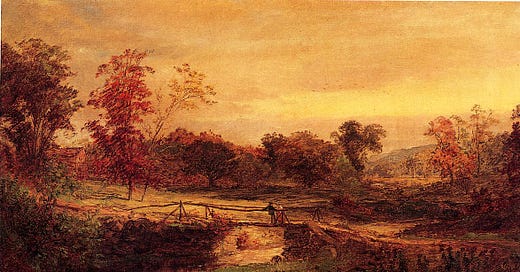Black cows lounge on the hills and gaze toward dusk;
the west is dying vermillion with the dust
raised up by restless hooves through this dry winter.
The wind lifts mothy ashes from the sweetgrass
to mix there—dust and ash and nearing sunlight—
while lonely crickets are fiddling their wings
in foolish strains of April, and of rain.
My mother’s filled our home with flowers she dried
some twenty years ago, with yellow paintbrush
and wild indigo which she would gather
while we went wandering throughout our pastures.
She taught me Latin prayers as I waded
the creek to wonder at the winking trout
whose pink prismatic backs cast up the sun.
We sometimes caught a pair, and we would cook
them there, the white flesh snapping in the fire.
Our modern drought’s a dull-toothed beast. It gnaws,
and we buy bread from megamarts, which bought
the grain from Kansas, maybe Illinois—
not here. Winters go by, and by, and though
the land thirsts, we forget—buy waxy fruit
and feed the cows grey pellets that they seem
to relish more than last year’s brittle grass.
But I have sometimes prayed. If it would rain,
the wild indigo would bloom again
and pastures turn the hue of aching twilight,
beckon the honeybee back from the north.
The creek first dried when I was maybe six.
The wind began to smell like rotting trout,
and so I went down to the creek and found
their skulls, some hollow, some unhollow, strewn
across the steps of shale. Each year the dead
are fewer. Some years, there’s neither creek nor flowers.
But then, for every year that’s dry, a chance
downpour astonishes my mother with
full-blossomed fields. They dazzle us with colors
we see once every dozen years, or less.
My mother keeps those flowers in a fragile
remembrance, of that time of former waters.
And now I sit atop the bank and look
down on unscavenged bones and turtle shells
and try to think of beauty which remains.
The cows are rising up to low at dusk.
There in the west are prowling thunderclouds
consuming dusk and stars and rust red hills.
They flog the plains and oil-leaking windmills
with orange lightning. A cricket strings a frenzy
then hushes. There’ll be fires tonight, and yet
there might be rain, and rain enough to smother
the liquid flames which slip down from the hills,
maybe enough to weight the wind-whipped ash,
and clean our windows. There might be rain, for while
the clouds do not speak peace over our land
but light down fires and disarrange the dust,
they might in kindness hear and answer us.
Originally published in the St. Austin Review
Sarah Elizabeth Ashbach is an MFA student with the University of St. Thomas. Her poems have appeared in The Chained Muse, St. Austin Review and Ekstasis, and she is the 2024 recipient of the Frost Farm Poetry Prize.
Read more of Sarah’s work in the latest issue of New Lyre - Fall 2024 & stay tuned for our interview on Sunday, Nov. 8th, 2024.
Our Fall Magazine Is Published!
Download or order the latest issue of our print journal, New Lyre Magazine
New Lyre Podcast #29: Poetry's search for the soul with Daniel Leach
What is the soul’s place in the modern world of poetry and culture? We speak with poet Daniel Leach about the changing tides in art and culture, false political dualities in the artistic realm, and the timeless quest for the poetic across the ages.
Keep reading with a 7-day free trial
Subscribe to The Chained Muse to keep reading this post and get 7 days of free access to the full post archives.







